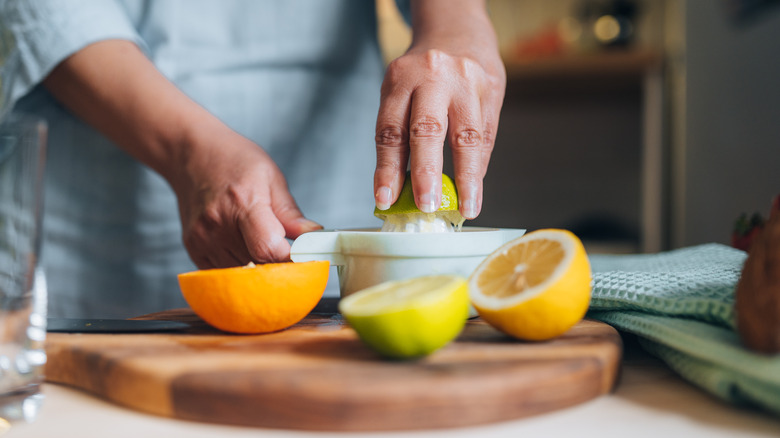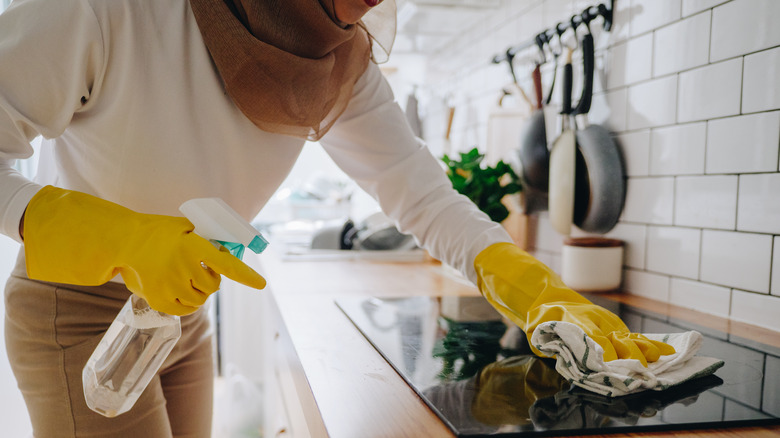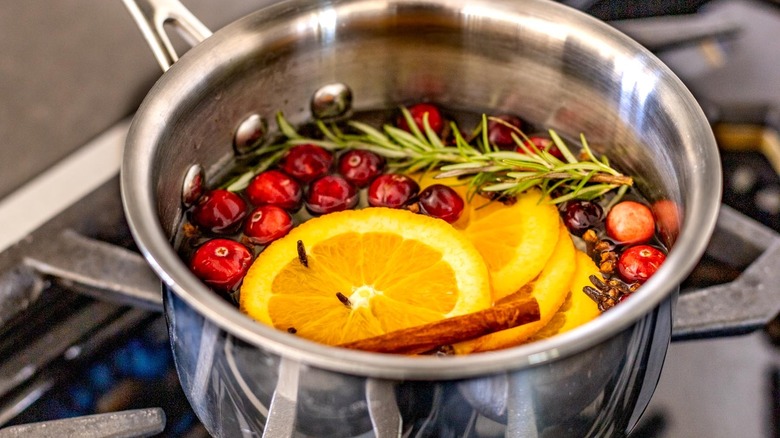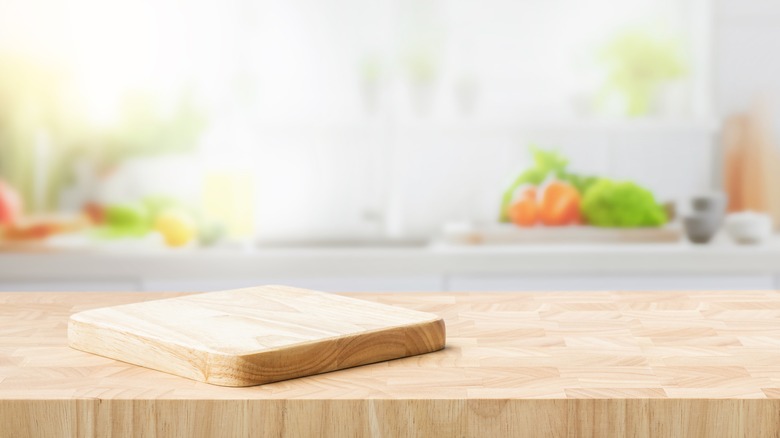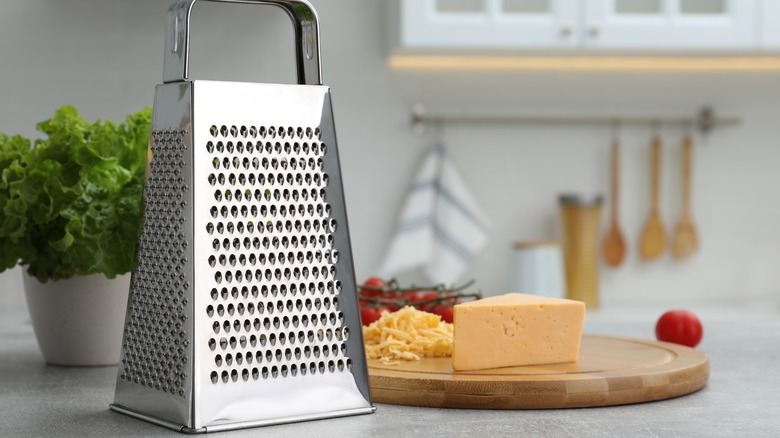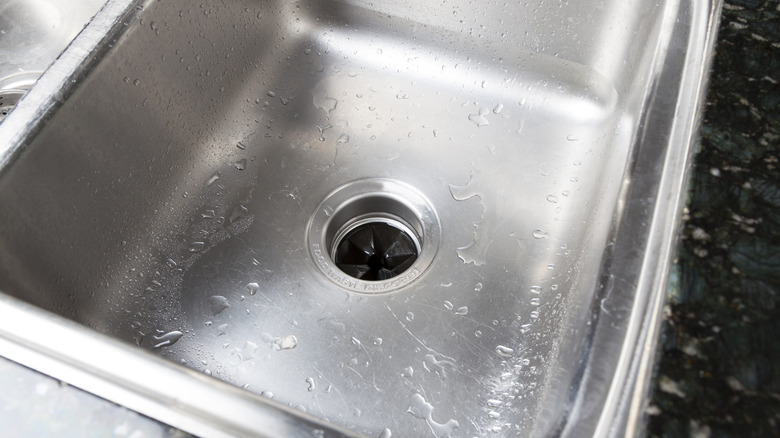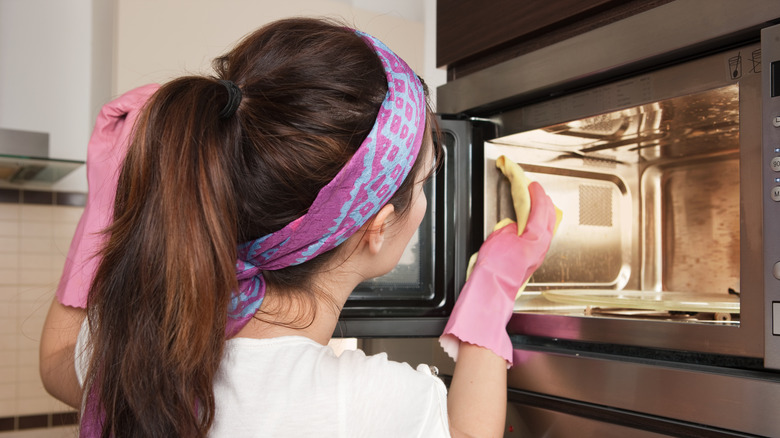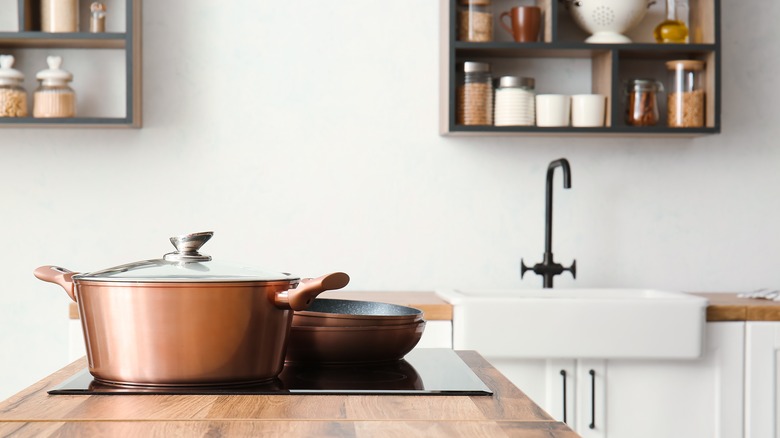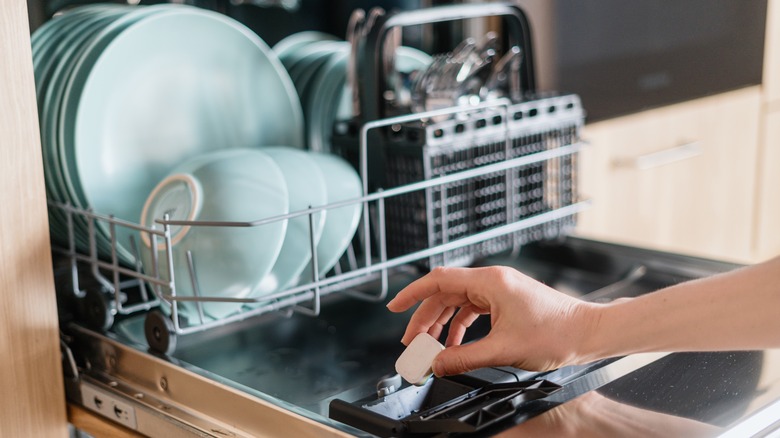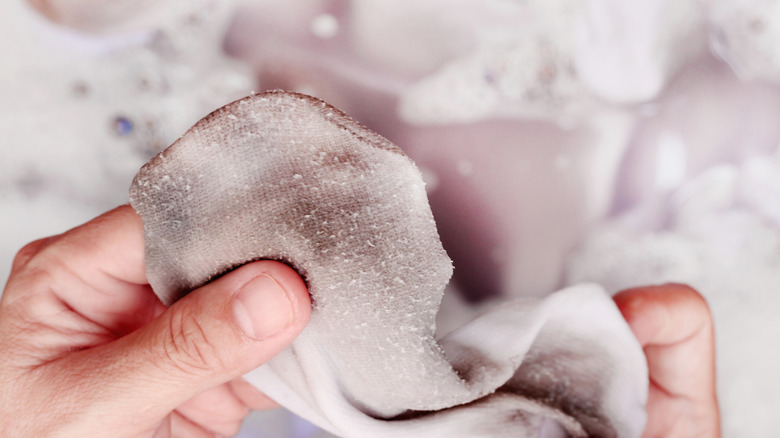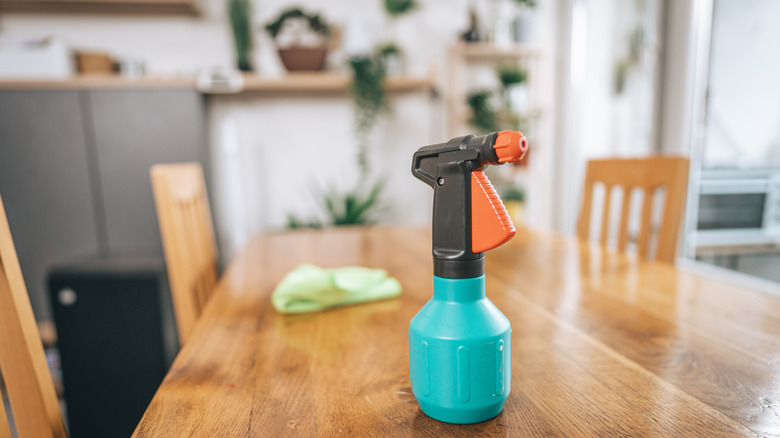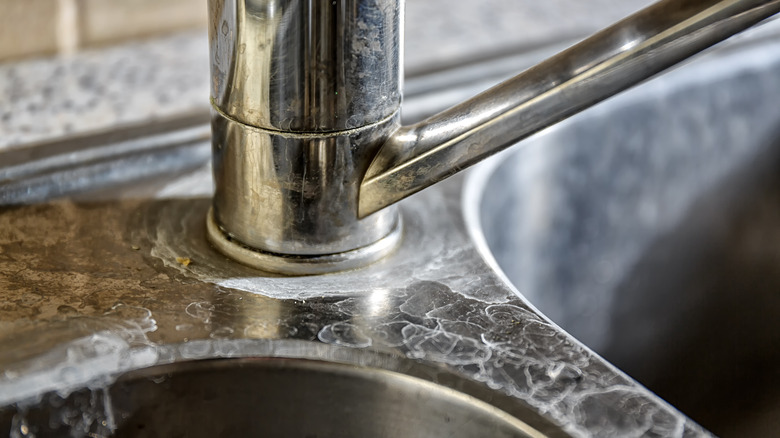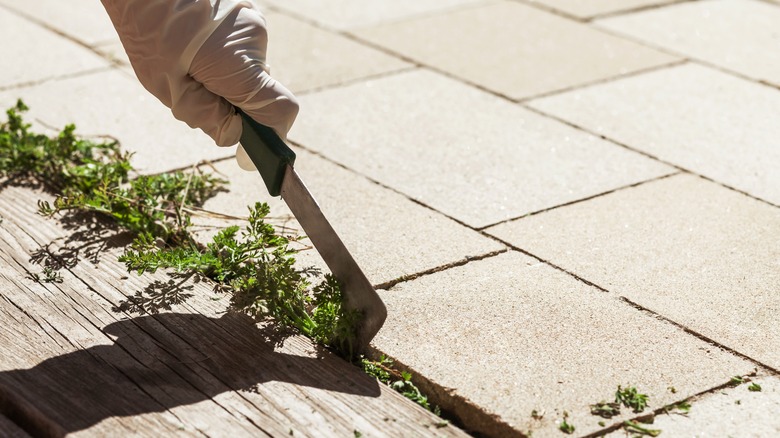17 Uses For Citrus Around The House You'll Wish You Knew Sooner
Most of us know that citrus fruits provide dietary benefits, since they are rich in vitamin C, fiber, potassium, and many more essential macronutrients. But lemons, limes, grapefruits, and citrons also contain many properties that make them extremely useful around the house. Whether you're using citrus in the home for aromatherapy or as a natural alternative to heavy-duty cleaners, thinking outside the box when it comes to these fruits can save you money and time.
What is it about citrus that makes it so great around the house? For one thing, citrus fruits are naturally rich in citric acid, which can aid in removing build-ups like mineral deposits and hard water stains. Citric acid can also inhibit the growth of certain bacteria by lowering the pH. In addition to citric acid, citrus fruits contain d-limonene, particularly in the oils found in their peels. D-limonene has insecticidal benefits and can be useful in repelling bugs and pests around the home. With such effective natural ingredients so readily available, you'll be surprised at the many ways citrus can revitalize your home!
Make your own cleaning products
Saving your citrus peels can pay off if you have an interest in non-toxic, natural cleaners you can make at home. The Kitchn provides an easy, adaptable recipe for an all-purpose cleaner that requires just citrus peels and vinegar (and a little time) to make. In this recipe, you simply fill half a mason jar with citrus peels, top it off with white vinegar, and store the concoction in a dark place for two or more weeks to infuse your cleaner with citrus oils. When you're ready to clean, you just strain the solution and funnel it into a spray bottle for everyday use.
This solution, and similar vinegar/citrus cleaning solutions, are great for kitchen surfaces, windows, and other areas where scum and gunk can cause streaks or scaling. The citric acid from your fruit peels combines with the acetic acid in vinegar to destroy bacteria naturally, without relying on harsher chemicals that people and pets are often sensitive to.
Eliminate stovetop grease
Cooked-on stovetop grease is one of the most stubborn and frustrating types of messes to deal with in the kitchen. Luckily, if you have half a grapefruit, lemon, or lime lying around, you can break down some stovetop messes with a little citric acid and elbow grease. Begin by coating the stovetop with a layer of salt, then add citrus juice and let sit for five to 10 minutes before gently scrubbing with a sponge and rinsing clean.
Some sources suggest using half a lemon or lime coated in baking soda directly as a scrubber for stovetops as well, cutting out the extra step involving a sponge in the previous method. Both baking soda and salt can work well on stovetop grease because they have gritty, exfoliating properties that can break up tricky kitchen messes. Scrubbing these ingredients into a stovetop on a regular basis can bypass the expense of chemical stovetop degreasers with materials you likely already have on hand.
DIY an air freshener
One of the best things about using citrus around the house in all of these applications is the bright, fresh smell of our favorite citrus fruits. If you're primarily interested in the scent of citrus, there are a few approaches to home air fresheners you can take with peels or slices of your favorite fruits. You can create a stovetop simmer pot with orange or grapefruit peels and home spices like cinnamon sticks, cloves, and vanilla. Just add your ingredients to a pot of water and bring to a boil until the scented steam floats through your home. This method is especially good for the winter, when heaters can dry out the air in your home, as the simmer pot humidifies the immediate rooms as well.
If a simmer pot isn't your style, you can also bake citrus slices in the oven for a pleasant home scent. The baking process itself will smell fantastic, but if you're an ambitious home crafter, you can also use an oven or dehydrator to dry out gorgeous citrus slices for homemade potpourri. Once properly dried, citrus slices can be added to bowls or drawer sachets for an even longer-lasting home scent. Just keep in mind that drying citrus slices in the oven requires patience, as the process can take 3–6 hours on low heat. At least you can enjoy the warm, citrusy smell in the meantime!
Renew cutting boards
In a similar method to the stovetop cleaner previously mentioned, you can revitalize wooden cutting boards by cutting a citrus fruit in half and using it to scrub salt into crevices and knife marks in your cutting board. Once the citrus juice and salt have been left to sit on the cutting board for 10 minutes or so, rinse the cutting board with warm water and let it air-dry. This method is particularly useful for deodorizing porous wooden cutting boards that retain the smell of garlic or onions after use.
It's important to clean cutting boards well, since bacteria can thrive in porous surfaces, such as wood and plastic. Because citric acid is a relatively weak acid in its fruit form, it may make more sense to use a stronger antibacterial method for a deeper clean, particularly if you're using your cutting board to prepare raw meat or poultry. Among the many ways to best clean a cutting board, this method is best for quick deodorizing or stain removal rather than deep cleansing.
Clean cheese graters
Cheese graters can be difficult to clean by hand and even in the dishwasher — it's easy for cheese to become caked on, stuck in grooves and crevices, or overlooked during the cleaning process. This is where citrus fruits can help. Run the flesh of a cut lemon, lime, or grapefruit over your grater after shredding cheese. The citrus juice can help dislodge any trapped cheese left on the grater that might be hard to see or reach.
On another note, did you know you could use cheese graters for crafting and organization around the home? Try this citrus cleaning method any time you're looking to repurpose an old cheese grater — from garden decorations to light fixtures, graters can be up-cycled in tons of creative ways. Cleaning these versatile materials with citrus could be the start of a brand new DIY decor hobby (or, at the very least, a clean grater)!
Eliminate odors in your garbage disposal
A home garbage disposal can be a cleaning lifesaver, but we're all guilty of being a little overzealous with its use. If you've put something you shouldn't down the garbage disposal, or you've simply been using the disposal frequently, it's more likely than not that it will eventually start producing unsavory odors. There's nothing grosser than the smell of rotting food coming from an otherwise clean kitchen sink — but a quick fix with some citrus fruit of your choice can help destroy or mask odors while you identify the source of the problem. Take a fresh citrus fruit of your choice and send a slice down your garbage disposal, then run the disposal with the water flowing. A pleasant citrusy smell will replace the damp, grimy odor and make your kitchen sink smell great!
When using this method, be sure to cut slices of your citrus fruit into small, easily grindeable pieces — otherwise you risk clogging your disposal and causing further problems. Wondering why this hack works? Aside from the naturally strong scent of fresh citrus fruit and peels, there's some evidence that citric acid can kill sources of organic odor. In an interview with Shape on the uses of citrus in fighting body odor, Dr. Geeta Yadav notes that "the alpha-hydroxy acid in citric acid can kill odor-causing bacteria" in armpits; the same principle likely applies to bacteria in your garbage disposal or around the house.
Clean your microwave
A dirty microwave can be a real pain to clean, especially when food messes get splattered and baked on to the sides. Those who dread the arduous task of cleaning the microwave will be happy to know that the same grime-busting properties of citrus that work on your kitchen stovetop can work in the microwave. Loosen stuck-on food by using citrus and steam to do the dirty work: Simply put half a cup of water in a microwave-safe bowl and squeeze the juice of a lemon into it, then throw the fruit itself into the water. Microwave on high until the liquid comes to a boil, which should be about three minutes. Let it sit for five minutes, then wipe and scrub the microwave as you normally would. Substitute grapefruit or lime for lemon if you prefer those scents!
This method is one of the easiest ways to clean your microwave, a crucial task if you want to ensure the cleanliness of your food prep. Gross microwave smells can not only affect the smell and taste of whatever food you're reheating, but leave bacteria in your microwave to contaminate future meals. Yuck!
Polish copper and brass
This age-old citrus solution for tarnished metals is one of the most satisfying ways to use citrus around the house; the visible improvement that citrus juice makes to dull and dingy copper and brass is always fun to behold. One method to polish tarnished copper pots uses citrus and salt — simply take half of a citrus fruit (most sites recommend lemon) and dip the cut side in salt. Use the lemon and salt to scrub tarnished areas and let sit for a few minutes, using the same process with the other half of the citrus fruit as needed. When the tarnish has disappeared, run your copper pot under warm water to rinse clean.
For brass or copper dishware and decor, you can also use lemon or citrus juice with baking soda to scrub tarnished areas that the previous method may not effectively reach. Get into the crevices of brass candlesticks and other items by squeezing the juice of half a lemon into a bowl, then mixing in a teaspoon of baking soda. Use a rag or microfiber polishing cloth to scrub the solution into your brass or copper, reapplying as needed. Rinse or wipe clean and dry with an additional cloth.
Boost your dishwashing with citrus
If you're lucky enough to have a dishwasher in your home, citrus can add a pleasant finishing touch to any wash cycle. Just place half of a citrus fruit of your choice — lemons, grapefruits, oranges, and limes will all do the trick — into your dishwasher alongside your detergent. The citric acid will help to polish the dishes and make them shine, while the citrus scent will linger on your clean dishes for an extra cleanliness boost.
No dishwasher, no worries — citrus can be a game-changer for hand-washed dishes, too. You can degrease pans and other dishes with about a tablespoon of citrus juice added to your soapy dishwater. Try using the stovetop method listed above — that is, half a citrus fruit coated with baking powder — for especially caked-on messes with pots and pans. Just be sure to remove any seeds or stems that could scratch the finish of your pots and pans before doing so.
Whiten dirty clothes and shoes
Citric acid comes to the rescue once again when it comes to whitening clothes and shoes. The stain-fighting properties of citrus can be especially useful for brightening dirty sneakers. To whiten sneakers or other canvas shoes, first soak them in water. In a separate bowl or container mix lemon juice (or the citrus juice of your choice) with water in a 1:1 ratio. Use a toothbrush or scrub brush to apply the citrus solution to the shoes and scrub away. Let the shoes sit for an hour, then rinse clean and leave them out to air-dry.
This hack has the added benefit of deodorizing shoes — or other stained clothes — while brightening up their appearance. It's not the only way to use household pantry items to deodorize sneakers naturally, but if you're worried that other common solutions like vinegar might leave a strong smell, citrus can be a lighter, airier scent for shoes that need less heavy-duty deodorizing.
Make your own furniture polish
You've probably used citrus-scented furniture polish that you can buy from the store, but did you know that you can make your own citrus furniture polish from kitchen ingredients? Mix one part citrus juice with two parts oil — most people recommend olive oil — and apply to wood furniture as you would commercial furniture polish. Some sites recommend adding vinegar to citrus furniture polishes as well, but the simplest versions use just citrus juice and oil. You can experiment with which recipes work best for you.
Cat owners who find themselves struggling to prevent their furry friends from scratching up their furniture may especially want to try this furniture polish on the wooden legs of armchairs or sofas. After all, cats are among the many animals who dislike the smell of citrus, so scenting their favorite scratching posts (aka your furniture) with lemon, grapefruit, or orange may repel them from the area.
Use peels to start seedlings
Home gardeners will know firsthand the importance of starting seedling crops in advance during the late winter months, but seedling pots can be expensive when you're working with a large variety of fruits or vegetables in your garden. You can always make your own planters using cardboard mailers or egg cartons, but if you're a fan of citrus fruits, you may find yourself with an even easier seed-starting option. When snacking on or cooking with your favorite citrus fruit, cut it in half and remove the flesh with a spoon. Use the empty halves of the peel to start seeds by adding an appropriate amount of soil and water. When your seedlings are ready, transplant the whole set-up, peel and all, into a larger pot or garden bed.
This is a great eco-friendly way to start seeds, and the citrus peels will naturally biodegrade — and add nutrients to your soil — over time. Keep in mind that even something as natural as a citrus peel can contain waxes and pesticides from commercial farms. If you're looking to keep your home gardening 100% organic, it's best to implement this method with peels from organic citrus fruits.
Remove hard water stains
Even brand-new bathroom fixtures can accumulate hard water stains. You know the kind — that chalky residue that forms from mineral-heavy water (also known as hard water). You can descale and shine your faucets with the stain-fighting acids from citrus fruits in a variety of ways. The simplest method is to rub a cut lemon or lime directly onto faucet spouts and handles. For stubborn hard water stains, try adding vinegar or baking soda to a citrus juice solution and scrubbing crevices with a toothbrush.
Don't forget the bathtub when it comes to hard water stains! To clean stains on not only your bathtub fixtures, but the tub itself, try using half a grapefruit or other citrus fruit with salt to lift stubborn stains from the porcelain. Your next shower will double as an aromatherapy session with the fresh citrus scent that's left over from your cleaning session.
Fight laundry stains and freshen clothes
According to Consumer Reports, part of the reason that citrus juice is so effective on stains is that the acids in citrus fruits add a charge to the molecules found in stains. The charged molecules then attract the charges in water molecules, which loosen the stains for easier removal. Consumer Reports senior test project leader Rich Handel also states that lemon juice acts as "a mild bleaching agent, and the acidity may help remove the combination that traditional antiperspirants and sweat create on white T-shirts," though he advises that citrus juice should not be used on colors when it comes to laundry.
With such powerful stain-fighting benefits, you may find yourself turning to citrus peels to not only whiten stained shirts or shoes, but to freshen your laundry overall. Add citrus peels to your next load of laundry in the main wash cycle, or soak clothes with the peels prior to your regular laundry routine to loosen dirt and create a lasting natural scent. Make sure you clean the peels well so that the flesh of the fruit doesn't end up smeared on your clean clothes.
Deter indoor pests
Remember that powerful pest deterrent we mentioned, d-limonene? Its abundance in citrus peels could help with both indoor and outdoor pest control. Try using orange peels in your garden to keep insects and other pests away from your plants, or to ward off stray cats who may see your garden as their own personal litter box. We recommend grinding the peels into a fine powder for sprinkling. But don't forget that indoor pests can be just as wily as outdoor pests, and the oils in citrus can be just as effective against them. Use the d-limonene in citrus oils to deter indoor critters like mice or fire ants that may have found their way into your home.
Citrus deters pests through its strong smell, which many animals are sensitive to. You can make your own citrus oil by simmering a lemon peel, orange peel, and a cup of olive oil in a pot and letting it steep for three hours. You can also extract oil from citrus peels with a garlic press after heating them in water, or use vodka to extract the oils from the peels slowly over the course of two weeks.
Make your own weed killer
Just as citrus can control pests, it can also control unwanted plant life around the garden. Making a weed killer spray that utilizes the acid of citrus juice can be a cheap and sustainable alternative to heavy chemical pesticides. To whip up this weed-busting spray, take 2 cups of distilled vinegar, 3 tablespoons lemon or citrus juice concentrate, 1 ounce of rubbing alcohol, and 2 teaspoons of dish soap and mix thoroughly. Dilute the solution with water as desired. Funnel your mix into a spray bottle and let weeds have it!
A brief disclaimer: The acetic and citric acids in this homemade spray are not only effective on weeds, but all plants. Make sure you use discretion when spraying this weedkiller around the garden, as a careless spraying could damage or kill your flowers or vegetables, too. It might make sense to set your spray bottle nozzle to the concentrated single-stream setting and testing the spray away from delicate plants before applying.
Manage outdoor garden pests
As mentioned above, citrus peels and homemade sprays are fantastic for driving away all sorts of pests, including stray cats, squirrels, mice, and insects. But citrus oils are also terrific for repelling snakes from your yard and garden. You can use citrus peels in a finely ground mix as we suggest above, or rub peels on railings, steps, and outdoor furniture directly to release the d-limonene that snakes hate.
For an even more targeted and direct snake repellent, fill a mason jar with lemon, orange, lime, and/or grapefruit rinds and let them steep in water overnight. After steeping for 24 hours or more, strain the solution into a spray bottle and spray it anywhere in your yard where snakes frequent. Keep snakes away from your next garden party with any of these simple, but effective, steps — and be sure to check your yard for other reasons snakes might be gathering, so that they stay away for good.
